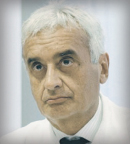In patients with triple-negative early breast cancer deemed to be at high risk for recurrence, 1 year of adjuvant avelumab did not significantly improve disease-free survival but did significantly improve overall survival and risk of distant disease–free survival events. The results from the European multicenter phase III A-BRAVE trial were presented at the 2024 ASCO Annual Meeting by Pierfranco Conte, MD, PhD, Full Professor of Oncology at the University of Padua in Italy.1
“Triple-negative breast cancer is the most immunogenic breast cancer subtype, and this may account for its sensitivity to immune checkpoint inhibitors. The A-BRAVE trial was designed to evaluate the efficacy of avelumab, an anti–PD-L1 antibody, as adjuvant treatment for patients with early triple-negative breast cancer at high risk…. It was the first randomized phase III adjuvant trial with avelumab in high-risk triple-negative breast cancer,” Dr. Conte said.

Pierfranco Conte, MD, PhD
Despite missing its co–primary endpoints, Dr. Conte viewed the findings as positive overall: “The 30% reduction in the risk of distant metastases and the 24% reduction in the risk of death suggest that avelumab may have a role in [patients with] early triple-negative breast cancer at high risk after primary surgery or with invasive residual disease after neoadjuvant chemotherapy.”
About A-BRAVE
The phase III randomized adjuvant study compared 1 year of treatment with avelumab vs observation in 477 patients with triple-negative breast cancer from 70 centers who were considered to be at high risk of relapse. Patients were enrolled after completing standard locoregional and systemic treatment with curative intent, including surgery and neoadjuvant/adjuvant chemotherapy.
Stratum A patients (18%, the adjuvant group) were deemed to be at high risk according to their tumor characteristics (pT2N1, pT3–4N0–3, pN2–3, and any T), whereas stratum B patients (82%, the postneoadjuvant group) had residual invasive disease in the breast or lymph nodes after neoadjuvant treatment. In stratum B, about 50% had stage II disease at surgery, and 50% had stage III disease; almost 50% were ypT1 and ypN0 at surgery; and 40% to 50% had a residual cancer burden score of 2.
Dr. Conte reported efficacy results in the intent-to-treat population and, in stratum A, the patients with residual disease after neoadjuvant chemotherapy. Co–primary endpoints were disease-free survival in the total population and in stratum B.
Co–Primary Endpoints Missed
At a median follow-up of 52 months, the two co–primary endpoints showed numerical improvements that missed statistical significance. Disease-free survival at 3 years in the intent-to-treat population showed a 5.1% difference favoring 1 year of avelumab: 68.3% vs 63.2% with observation (hazard ratio [HR] = 0.81; P = .172). In stratum B, testing adjuvant avelumab following neoadjuvant therapy, disease-free survival rate was 66.9% vs 60.7%, respectively (HR = 0.80; P = .170), Dr. Conte reported.
In contrast, the overall survival difference of 8.5% at 3 years, for the intent-to-treat population, was statistically significant, based on rates of 84.8% with avelumab vs 76.3% with observation (HR = 0.66; P = .035). “Trying to understand why we did observe a greater benefit with avelumab in overall survival, we performed a post hoc exploratory analysis of distant disease–free survival,” he said. As with overall survival, avelumab treatment led to a 75.4% rate vs 67.9% (HR = 0.70; P = .0277), showing the drug’s ability to prevent distant metastases.
Avelumab was reported to be well tolerated, and most patients were able to complete the treatment. Fewer than one-third of treatment discontinuations were for toxicity. Correlative analyses are being performed on tumor tissue, plasma, and feces, he said.
Expert Point of View

Javier Cortes, MD, PhD
ASCO discussant Javier Cortes, MD, PhD, Head of the International Breast Cancer Centre in Barcelona, commented on the A-BRAVE findings: “Although these data do not show a statistically significant benefit with adjuvant avelumab, it appears that some patients with significant residual tumors after neoadjuvant systemic therapy without immunotherapy might benefit.” He pointed out that this subset of patients may be relatively small, since most patients with triple-negative disease now receive pembrolizumab in the neoadjuvant setting, based on the robust efficacy shown in KEYNOTE-522—a 37% reduction in risk (P < .001) of a major adverse clinical event or death.2
Dr. Cortes also noted that the large ALEXANDRA/IMpassion030 trial3 of another anti–PD-L1 agent atezolizumab in the adjuvant setting (with chemotherapy) was “completely negative … without any signal for event-free survival,” in contrast to A-BRAVE, in which disease-free survival was also negative but a significant effect on distant metastases and overall survival was shown. This difference could possibly be the result of the drugs’ mechanisms of action. “With avelumab, there is a very weak interaction with PD-L2, and it’s possible this weak signal could have some benefit,” he suggested. In preclinical studies, blockade of PD-L2 in addition to chemotherapy produced tumor remission, he noted.
Perhaps clearer are A-BRAVE’s findings regarding the potential role of avelumab after upfront surgery. In this subset—18% of the study population—the number of events between the arms was essentially equal. “Based on these data, avelumab should not be considered in the adjuvant setting, just the pure neoadjuvant setting. If the patient has significant residual disease after neoadjuvant chemotherapy without pembrolizumab, I might consider avelumab,” Dr. Cortes concluded.
DISCLOSURE: Dr. Conte has served as a consultant or advisor to Daiichi Sankyo/Lilly, Gilead Sciences, and Reveal Genomics; has received institutional research funding from Merck KGaA; holds a patent for the HER2DX assay; and has given expert testimony for AstraZeneca. Dr. Cortes reported financial relationships with MAJ3 Capital, AstraZeneca, Celgene, Daiichi Sankyo, Eisai, Gilead, Lilly, Merck Sharp & Dohme, Novartis, Pfizer, Roche, Samsung, Stemline Therapeutics, AbbVie, Athenex, Bioasis, Biocon, Bioinvent, BioNTech SE, Boehringer Ingelheim, BridgeBio, Cellestia Biotech, Clovis Oncology, Ellipses Pharma, Erytech Pharma, Expres2ion Biotechnologies, GEMoaB, GlaxoSmithKline, HiberCell, Jazz Pharmaceuticals, Leuko, Menarini, Polyphor, Reveal Genomics, Roche, Seagen, Servier, and Zymeworks.
REFERENCE
1. Conte P, Dieci MV, Bisagni G, et al: A-BRAVE trial: A phase III randomized trial with avelumab in early triple negative breast cancer with residual disease after neoadjuvant chemotherapy or at high risk after primary surgery and adjuvant chemotherapy. 2024 ASCO Annual Meeting. Abstract LBA500. Presented June 3, 2024.
2. Schmid P, Cortes J, Dent R, et al: Event-free survival with pembrolizumab in early triple-negative breast cancer. N Engl J Med 386:556-567, 2022.
3. Ignatiadis M, Bailey A, McArthur H, et al: Adding atezolizumab to adjuvant chemotherapy for stage II and III triple-negative breast cancer is unlikely to improve efficacy. Cancer Res 84(suppl 9):GS01-GS03, 2024.

